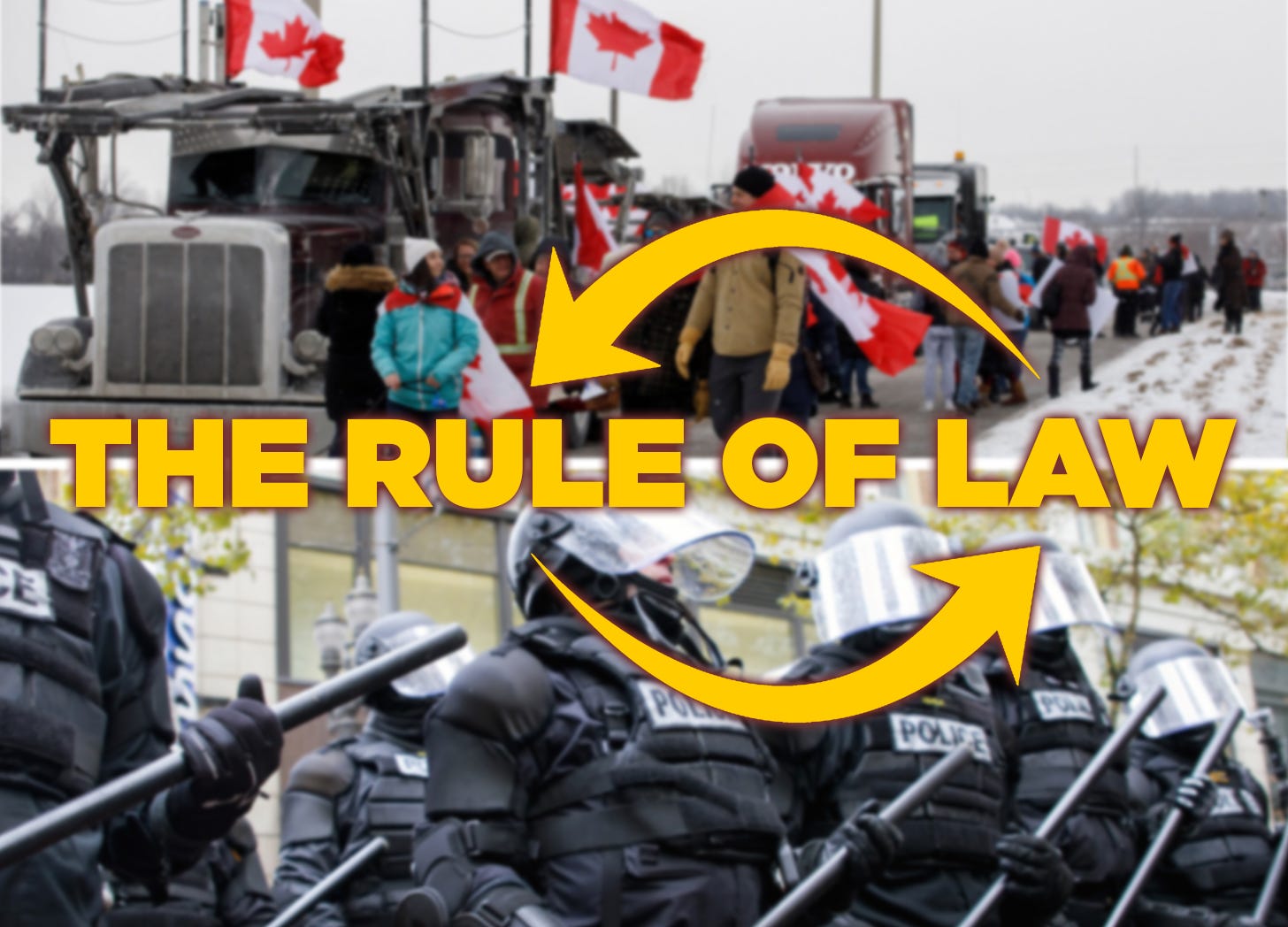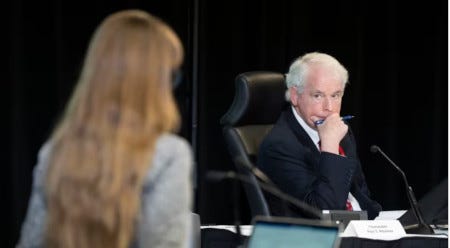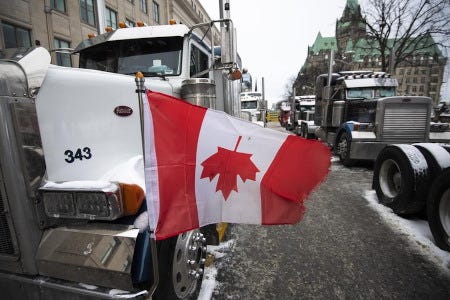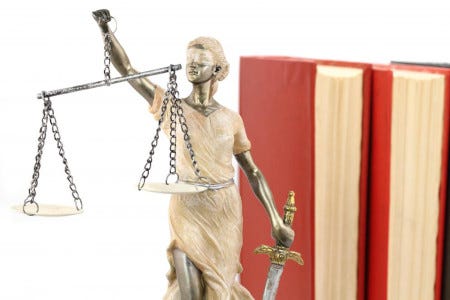
As viewers and listeners of The Corbett Report will know by now, it's official: Canada has criminalized dissent.
Yes, Paul Rouleau—the judge appointed by the Canadian government to lead the Public Order Emergency Commission examining the Canadian government's decision to invoke the Emergencies Act last year to crack down on the Freedom Convoy—has delivered his thoroughly unsurprising verdict: the Canadian government was completely justified in its actions!
So what does this all mean?
For starters, it means that government officials now have carte blanche to invoke the Emergencies Act whenever they want in order to squelch any protest movement they dislike before the protest has the chance to effect any significant change.
But beyond that, we are witnessing the apotheosis of that rule by emergency that I identified last year as the new governing paradigm for the erstwhile "liberal Western democracies."
And if that realization doesn't send a chill down your spine, then you're not paying attention.
Strap in, folks. We're going for a deeeeeep dive into the murky world of law, philosophy and government this week.
THE DECISION

Last February, the Canadian government invoked the Emergencies Act to deal with the "national emergency" posed by the honking horns and bouncy castles of the Freedom Convoy protesters.
As I explained late last year, the Emergencies Act is the successor to the War Measures Act, a statute passed by Canadian Parliament in 1914 to provide the government with extraordinary emergency powers in times of war, invasion or insurrection. The War Measures Act was invoked only three times in Canadian history:
-
during WWI, when it was used to lock up Ukrainian Canadians in internment camps and to quell the Quebec City anti-conscription riots;
-
during WWII, when it was used to lock up Japanese Canadians (and anyone else deemed to be "about to engage in activities prejudicial to the public safety or the safety of the State") and to censor the press;
-
and during the October Crisis in 1970, when it was used to suspend the writ of habeas corpus, outlaw the Front de libération du Québec, and arrest hundreds of Canadians without charge.
If it occurs to you that each invocation of the War Measures Act involved unconscionable breaches of basic civil rights, then you're not alone. By 1988, the Canadian government—pressured by survivors of the Japanese internment and other critics of the act—was compelled to table a bill to replace the War Measures Act with a new piece of legislation. This new legislation would, in the words of one member of Parliament, "show those Canadians who have suffered that we have learned from the abuses of the past [. . .] show them our determination that such abuses will never happen again in this country [. . . and] restore their faith in this country and its democratic, political, and judicial processes."
Instead, Canadians got the Emergencies Act.
Now, in lieu of an act that could be invoked in the event of war or insurrection, granting the government the authority to violate basic civil liberties and upend the rule of law, there was an act that could be invoked in the event of war, insurrection, natural disaster, or perceived threat to national security (including, evidently, political protests involving honking horns and bouncy castles), granting the government the authority to violate basic civil liberties and upend the rule of law. (Huzzah?)
The seal on the Emegencies Act remained unbroken from its passage in 1988 until 2022, when the events of the Freedom Convoy necessitated—in the eyes of Trudeau's cabinet—an extraordinary crackdown.
At the time that the act was passed, freedom-loving Canadians were assured that the government would invoke it only in times of extreme emergency and would be careful to use the powers it afforded judiciously. But, as an extra layer of insurance against authoritarian overreach, the act also included a clause requiring "an inquiry to be held into the circumstances that led to the declaration being issued and the measures taken for dealing with the emergency." According to this provision, the inquiry's findings are to be presented in a report to Parliament within 360 days of the revocation of the emergency.
Thus it was that last April, Paul Rouleau—a long-time donor to the Liberal Party of Canada—was appointed to head the Public Order Emergency Commission examining the Liberal government's invocation of the act. And (wouldn't ya know?), Rouleau announced last week that Trudeau and his cronies were indeed justified in declaring the emergency, forcibly removing the Freedom Convoy protesters, freezing their bank accounts, and generally destroying the last vestige of free speech and permitted public protest in Canada.
For those who want all the nitty-gritty details, you'll want to check out my podcast episode on the inquiry from late last year, Canada's Freedom Convoy, my interview with Rob Kittredge and Hatim Kheir about their participation in the inquiry, and my brand-new podcast on Rouleau's report, Canada Criminalizes Dissent. And, of course, you can read the final report (all five volumes of it) for yourself on the commission's website.
But for those who prefer to cut to the chase, here are Rouleau's own words summarizing his report's main finding:
For reasons that I discuss in detail in the report, I have concluded that when the decision was made to invoke the act on February 14, 2022, cabinet had reasonable grounds to believe that there existed a national emergency arising from threats to the security of Canada that necessitated the taking of special temporary measures.
WHAT IT MEANS

Justice [sic] Rouleau is at pains to stress in his report and in his remarks that his decision does not bear on the legality of the government's actions (that's to be officially determined in a forthcoming judicial review of the matter). He also indicates that this was not a clear-cut, slam-dunk case: "I do not come to this conclusion easily, as I do not consider the factual basis for it to be overwhelming. Reasonable and informed people could reach a different conclusion that the one I arrived at."
Nonetheless, the findings of the commission will have important and long-lasting effects on the course of Canadian politics, society and law.
On the most basic practical level, Rouleau's report offers a list of 56 recommendations for the government to implement. As I discussed in my recent report, this list includes a number of recommendations for giving police and intelligence agencies even more power to spy on and coordinate military-like operations against the country's own citizens. It also contains recommendations on a wide range of subjects that seem beyond the scope of such an inquiry, including a recommendation that the government should "study the impact of social media" with the aim of "addressing the serious challenges that misinformation, disinformation, and other online harms present to individuals and Canadian society" and a recommendation encouraging the government to "continue with its study into cryptocurrencies."
On a broader level, Rouleau's ruling effectively breaks the seal on the Emergencies Act. After 34 years on the shelf, many of the questions surrounding the act have now been answered:
Would the act be used in peace time?
Would it be used against peaceful protesters?
Would it be used to suspend basic charter rights?
Would the government rig the inquiry into the emergency declaration by appointing a political crony and giving him a narrowly defined mandate that is bound to produce a report that exonerates the government?
The answer to all of these questions is a resounding: "You bet!"
That answer won't be surprising to regulars in The Corbett Report audience. But given that the majority of Canadians are (sadly) not Corbett Reporteers, it does have significance for the future of the country. How could Rouleau's finding do anything but embolden Trudeau's government (or indeed any future Canadian government) to invoke the Emergencies Act at the first sign of genuine mass protest? If the Canadian people go along with the commission's verdict, either by actively supporting it or passively accepting it, then what mechanism of accountability will ever cause any cabinet to think twice about pulling the emergency trigger?
This is why, as I pointed out in Canada Criminalizes Dissent, Rouleau emphasized that he saw the "first and foremost" task of the commission to be "to foster public confidence."
To "foster public confidence" in what, exactly? In the government itself, presumably. In the rectitude of its actions. In the proportionality of its response to the perception of the threat posed by non-violent protesters. And in the process itself. "Don't worry, Canadians," Rouleau wishes to say. "The government has investigated itself and found itself guiltless."
And, as I also observed in my recent podcast, this points once again to the centrality of our role in these events. We are not spectators in a stage play titled "The Emergencies Act and the Commission of Inquiry." Or, to the extent that we are, it is only because we fail to realize that this charade of an inquiry is precisely that—a piece of theatre put on solely for our benefit. A political puppet show designed to placate us into thinking that those people over there did something to those other people over there and that a Very Serious Person investigated that something and found it to be in order.
Regular viewers of my work will understand the importance of this observation: the tyrants can only function as tyrants if we acquiesce. We the people truly do hold the power, and political authoritarianism is indeed—as Étienne de La Boétie pointed out more than 500 years ago—a form of voluntary servitude.
In other words, if we decide, on the basis of this charade of an inquiry, that protesting is now illegal and thus not worth taking the risk, then Trudeau and his minions win. Indeed, the government only truly wins if we roll over and accept the commission's report at face value.
But there are even deeper, more fundamental questions that are raised by this entire affair. Questions that go beyond the boundaries of Canada or the time frame of 2022. Questions that threaten to topple our very conception of "the rule of law."
Rouleau himself even raised the specter of these questions in his report:
Tensions between order and freedom sit at the heart of our system of governance. Freedom cannot exist without order, because the machinery of order — such as procedures, laws, police, and courts — create the conditions for the protection of freedom, the enjoyment of freedom, and the mediation of conflicting freedoms. [. . .] It is commonly assumed or asserted that tensions and trade-offs between order and freedom are a distinctive problem of emergencies and emergency powers. In fact, they are not. The fundamental and inevitable tension between order and freedom is a constant; it is simply more visible, and more stark in a time of emergency. In times of emergency, however, freedoms that are usually unconstrained may suddenly be curtailed. This puts a spotlight on the clash of values.
What Rouleau writes is certainly true from the perspective of our Western concept of jurisprudence and political governance. But buried within that perspective are some hidden (and very ominous) assumptions about the rule of law.
THE LAW OF RULE

That freedom cannot function without order is one of those faux-profound truisms that appeal to people who have not thought seriously about the basis of their society and don't want to be troubled with anything that would deepen their understanding of the world.
Freedom cannot function without order. Therefore, we institute governments to codify the law and protect order. Or, in a nutshell, we need the "rule of law."
But even a philosophical novice can see the leap in logic inserted into this argument, namely that order must be codified and protected by government. That is the received wisdom that holds sway in the minds of the average inhabitant of a Western liberal democracy. For them, "the law" is whatever is written by legislators, who have been selected for their task by whatever form of political legitimization (usually election) applies in a given political jurisdiction.
But laws written down by lawmakers in fact represent one particular conception of law: statutory law. Opposed to this is the entire tradition of common law—a body of laws derived from the history of judgments of recognized arbiters (judges) within a given community.
In common law, "the law" is not a single, unified, monolithic, unquestionable set of rules that pertains everywhere and at all times within a given area. Nor is it something that has been written down by a ruler and that must be slavishly obeyed by the ruled.
Instead, the common law balances stability and fluidity, resting on a community's historical judgments, which act as guidelines for future rulings but remain capable of changing with the exigencies of circumstance.
It is not difficult to see who benefits when statutory law is conflated with "the law" in the minds of the public. Of course, the beneficiaries are the erstwhile "lawgivers" who are in the positions of power to set the rules governing society simply by putting pen to paper. In other words, the "rule of law" that the masses clamber for is—in a society of statutory law—exposed as simply the law of rule: those who rule make the laws.
The stark reality of the situation is that our concept of law differs only superficially from that promulgated by the monarchs and tyrants of old: that law is whatever the sovereign declares it to be, whenever he declares it. The masses have been placated by the various Magna Cartas and Constitutions and Charters of Rights and Freedoms that have arisen in our modern liberal democracies, each purporting to put checks and balances on the right of the sovereign to act as a tyrant. Under "the rule of law," we are told, even the sovereign must obey the restrictions and limitations that have been legislated into existence to protect our basic rights and liberties.
But, as Rouleau correctly observes, these "checks and balances" are a mirage, and it is at times of declared emergency that "the rule of law" is revealed to be nothing more than the law of rule. A state of exception exists in every statutory law, a moment of aporia in which all the rules and restrictions on the sovereign can be jettisoned at a moment's notice based on the sovereign's own decree. In Canada, that state of exception currently takes the form of the Emergencies Act.
It is in the invocation of the Emergencies Act, then, that we can see the modern system of checks and balances on political power for what it is: mere words, not worth the paper they're written on.
Once again, this will not be surprising to those who have studied this legal history in detail or those who are familiar with my work on States of Emergency. In that report, released just days before the invocation of the Emergencies Act, I outlined the new ruling paradigm for the planet—rule by emergency decree—and tied it into the rollout of the Homeland Security state post-9/11 and the rollout of the biosecurity state post-COVID.
In that work I quoted extensively from the brilliant Italian philosopher Giorgio Agamben, especially his seminal book on this topic, State of Exception, in which he observes that "modern totalitarianism can be defined as the establishment, by means of the state of exception, of a legal civil war that allows for the physical elimination not only of political adversaries but of entire categories of citizens who for some reason cannot be integrated into the political system."
And, as Agamben sagely warns, our ignorance of the true nature of the legal paradigm that we are living under is no mere failure of understanding. It is a matter of life and death.
The juridical system of the West appears as a double structure, formed by two heterogeneous yet coordinated elements: one that is normative and juridical in the strict sense (which we can for convenience inscribe under the rubric potestas) and one that is anomic and metajuridical (which we can call by the name auctoritas).
The normative element needs the anomic element in order to be applied, but, on the other hand, auctoritas can assert itself only in the validation or suspension of potestas. Because it results from the dialectic between these two somewhat antagonistic yet functionally connected elements, the ancient dwelling of law is fragile and, in straining to maintain its own order, is always already in the process of ruin and decay. The state of exception is the device that must ultimately articulate and hold together the two aspects of the juridico-political machine by instituting a threshold of undecidability between anomie and nomos, between life and law, between auctoritas and potestas. It is founded on the essential fiction according to which anomie (in the form of auctoritas, living law, or the force of law) is still related to the juridical order and the power to suspend the norm has an immediate hold on life. As long as the two elements remain correlated yet conceptually, temporally, and subjectively distinct (as in republican Rome's contrast between the Senate and the people, or in medieval Europe's contrast between spiritual and temporal powers) their dialectic—though founded on a fiction—can nevertheless function in some way. But when they tend to coincide in a single person, when the state of exception, in which they are bound and blurred together, becomes the rule, then the juridico-political system transforms itself into a killing machine.
Whether we interpret Agamben's "killing machine" to be the use of a state of exception to authorize agents of the state to literally murder any declared enemy or we interpret it, in light of the Emergencies Act, to mean the use of a state of exception to subdue opponents of statutory laws mandating a medical intervention that has been shown to cause death, the result is the same. The stakes of this "game" of interplay between politics and jurisprudence could not be higher.
Indoctrinated as most people are in the belief that statutory law is "the law," and incapable as most people are of thinking beyond the boundaries of the pat truisms rulers throw out to placate the masses ("there can be no freedom without order"), it is difficult for us to conceive of a way out of this impasse.
If "the law" truly is whatever a government says it is, if we do need government in order to hand down these laws from on high and to police itself when it has abused those very laws, then what choice do we have? We must simply put ourselves at the behest of our rulers, hope they will make the right decisions, and hope we will have the firepower (literal or figurative) to resist them should we decide that it is necessary.
However, if we begin to interrogate our own assumptions, it is possible for us to formulate a seemingly equivalent but actually radically different concept of law and order. Yes, there can be no freedom without laws that form a framework for order. That is to say, there can be no freedom without common laws derived from centuries of community experience that form a framework for spontaneous order.
In this apparently slight philosophical adjustment, we begin to see a way to abolish the killing machine of the "law of rule" and to institute a true rule of law.
But as long as we continue to believe our erstwhile rulers' lie that "the law" is whatever they write down on their magical pieces of paper, we will be subject to the current governing paradigm of the planet—the law of rule—and the killing machine to which this law of rule inevitably gives rise.
The choice, as usual, is ours to make. And, as usual, we find that the true battlefield is not the streets of Ottawa but the space between our ears.







